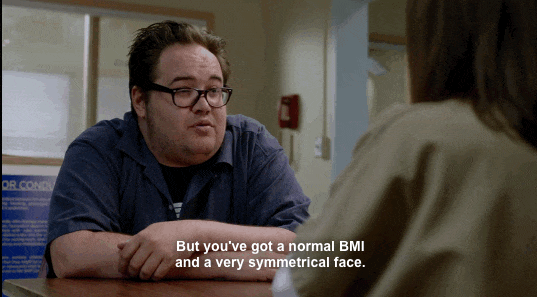Even as kids, we understood the clear message of those color coded BMI charts at the doctors office. “Normal” was green, which was a healthy weight. “Overweight” was orange, which meant worse. “Obese” was red, which meant unhealthy.
Those hard limits have become so conditioned in our mind that we forget about how ridiculous they are. When you think about it, it seems clear that there is hard limit where you suddenly go from being “healthy” to “unhealthy.”
Being “healthy” is not a hard line; it is making a serious of choices day in and day out to do what is best for your body. Learning to understand health in these terms allows us to reevaluate what we think we know and get rid of our misconceptions about being a “healthy” weight.
1. Science has determined what a healthy weight is

GIF courtesy of giphy.com
Breaking down BMI into these strict categories hinders our ability to understand different weights. Studies that look at obesity tend to lump everyone with a 30+ BMI. This assumes that the health effects of a having a BMI of 50 are the same as having a BMI of 31. In reality, we know little about the variance within this vast group.
The problems with understanding these categories extends beyond obesity. Most studies research the effects of obesity, and we just assume that the same negative effects apply to those who are overweight. However, research has repeatedly shown that those considered overweight actually tend to live longer.
These findings so strongly contradict our prevailing notions of what it means to be a “healthy” weight that they’ve largely been glossed over by the scientific community and the media. It’s just too difficult to swallow.
2. Weight is the most important health indicator

Photo by Sam Dilling
One possible reason that people considered overweight may actually live longer is that they have more muscle. I am just speculating, but my point is that weight is far from the most important indicator of health.
Muscle mass and waist size are both far better predictors of health. Other indicators of overall health include mood, toilet habits, and sleep pattern.
Also keep in mind that certain weights are only considered “healthy” because they contribute to better resting heart rate, blood pressure, cholesterol levels, etc. If you have an incredibly healthy body then it really does not matter if you are technically of an unhealthy weight.
3. “Healthy” looks a certain way

Photo courtesy of Dove.com
Fitspo has replaced thinspo, but that does not make it any less damaging. Seeing pictures of people with perfectly tanned and toned bodies makes us think that we must look like that in order to be “healthy.”
But now that we know that people who are overweight are not necessarily unhealthy, we must broaden our view of what a “healthy” weight looks like.
We must also keep in mind that people of the same weight can look drastically different depending on where they carry their weight and how much of it is muscle. Therefore, even people of a “healthy” weight come in all shapes and sizes. Trying to look a certain way will only make us less physically and mentally healthy.
4. A healthy weight can be achieved by dieting

GIF courtesy of Tumblr.com
If you’re still looking to drop some pounds and achieve that so-called healthy weight, then kick the diet. The “diet” mentality promotes making drastic changes for a short amount of time. In reality, people should focus on making realistic and sustainable lifestyle changes.
The best way to lose weight is by learning to eat mindfully. Listening to your bodies can be very difficult. However, eating only when actually hungry, while still indulging in your cravings is the best way to ensure physical and mental health.
5. We should strive to achieve that healthy weight

Photo by Jennifer Cao
Not all of us are meant to be a “healthy” weight. People tend to have set point, or a weight that their body gravitates towards. Set point is determined by genetics and childhood weight, and your body will always fight to return to it, even if it is technically considered “unhealthy.”
When you drop below your set point, your metabolism slows, requiring you to restrict caloric intake even more. This metabolic effect makes it very difficult to maintain weight loss below one’s set point, which is why people tend to gain back what they have lost.
This leads to yo-yo weight loss, which can actually be worse for the body than being mildly overweight. So if you find that your body naturally gravitates towards an “unhealthy” weight, it is probably best to figure out how you can be healthiest at that weight rather than trying to lose the extra pounds.


